江苏中考英语复习之初中英语主要时态系列(一)—— 一般现在时讲解及练习
(完整)苏教版九年级上册英语语法复习要点

九年级上册英语语法复习要点一、时态复习1.一般现在时概念:经常、反复发生的动作或行为及现在的某种状况。
时间状语:always, usually, often, sometimes, every week (day, year, month…), once a week, on Sundays, etc.基本结构:①be动词;②行为动词否定形式:①am/is/are+not; ②此时态的谓语动词若为行为动词,则在其前加don’t,如主语为第三人称单数,则用doesn’t,同时还原行为动词。
一般疑问句:①把be动词放于句首;②用助动词do提问,如主语为第三人称单数,则用does,同时还原行为动词。
2.一般过去时概念:过去某个时间里发生的动作或状态;过去习惯性、经常性的动作、行为。
时间状语:… ago, yesterday, the day before yesterday, last week(year, night, month…), in 1989, just now, at the age of 5, one day, long long ago, once upon a time, etc.基本结构:①be动词;②行为动词否定形式:①was/were +not;②在行为动词前加didn't,同时还原行为动词。
一般疑问句:①was或were放于句首;②用助动词do的过去式did 提问,同时还原行为动词。
3.现在进行时概念:表示现阶段或说话时正在进行的动作及行为。
时间状语:now, at this time, these days, etc.基本结构:am/is/are + doing否定形式:am/is/are + not + doing.一般疑问句:把be动词放于句首。
4.过去进行时概念:表示过去某段时间或某一时刻正在发生或进行的行为或动作。
时间状语:at this time yesterday, at that time或以when引导的谓语动词是一般过去时的时间状语等。
中考英语备考:初中英语主要时态系列讲座(一)---一般现在时精讲及练习(含答案)
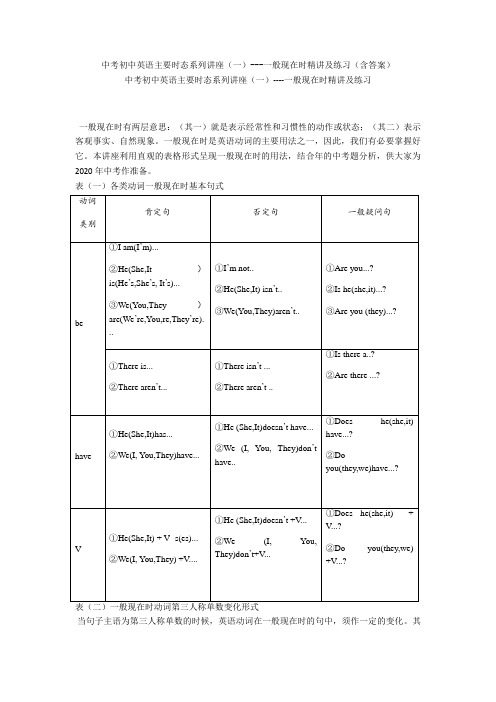
中考初中英语主要时态系列讲座(一)---一般现在时精讲及练习(含答案)中考初中英语主要时态系列讲座(一)----一般现在时精讲及练习一般现在时有两层意思:(其一)就是表示经常性和习惯性的动作或状态;(其二)表示客观事实、自然现象。
一般现在时是英语动词的主要用法之一,因此,我们有必要掌握好它。
本讲座利用直观的表格形式呈现一般现在时的用法,结合年的中考题分析,供大家为2020年中考作准备。
表(一)各类动词一般现在时基本句式当句子主语为第三人称单数的时候,英语动词在一般现在时的句中,须作一定的变化。
其变化规则与名词单数变复数相同。
具体见下表:表(三)一般现在时常用时间状语由于一般现在时主要表示经常性或习惯性的动作,所以,在句中就有一些表示性惯性或经常性的副词或短语去说明动作的经常性或习惯性。
现将于一般现在时相关的这些副词或短语,归纳在表中,供大家掌握。
表(四)一般现在时的主要用法(北京) Sam ______with his friends every weekend.A. skatesB. is skatingC. has skatedD. was skating【析】正确答案:A 。
句意是:每个周末,山姆都和朋友们一起滑冰。
根据句末的频度副词短语every weekend(每周末)可知,句子表示的动作具有经常性,所以动词应使用一般现在时。
【典型考例2】(青海)----What did you learn in geography yesterday?----I learned that the sun _____ in the east.A.was risingB.risesC.rose【析】正确答案:B。
句意是:昨天的地理课上你学了什么?我学了太阳从东边升起来。
太阳从东边升起来,表示的客观事实,一种自然现象,所以,句中的动词应使用一般现在时,因此,正确答案为B。
【典型考例3】(山东临沂)---I'm getting hungry. Do you know where we can get some good food?--- Of course! There ____________ a restaurant around the comer.A. will beB. wasC. is【析】正确答案:C。
一般现在时 精讲精练-2021届九年级英语寒假复习课(江苏机构用)
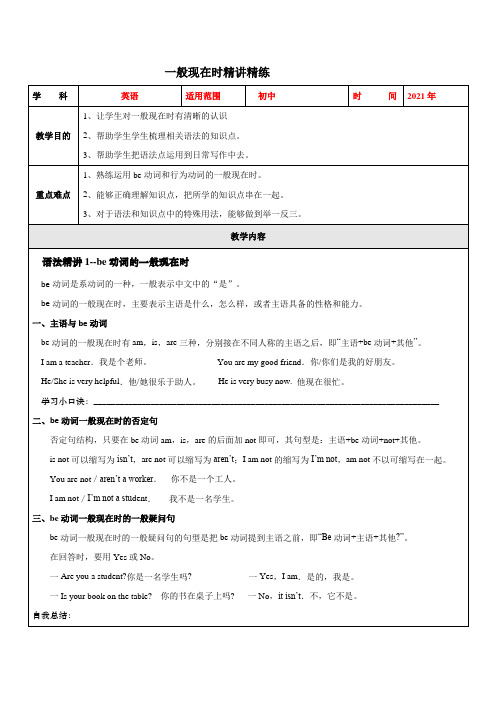
9.What colour _________their hair?
10.What_________your English teacher like?
二、单项选择
( )1.My sister is _______ now.She is in Class 8,Grade 7.
否定句结构,只要在be动词am,is,are的后面加not即可,其句型是:主语+be动词+not+其他。
is not可以缩写为isn’t,are not可以缩写为aren’t;I am not的缩写为I’m not,am not不以可缩写在一起。
You are not/aren’t a worker.你不是一个工人。
5.含有实义动词的一般现在时态的句子转换
由肯定句变为一般疑问句的步骤(不要因为熟悉就忽略):
a.把be动词(am , is , are)或情态动词(may , can , must , should)提前。
b.大写和小写的转换,句首的第一个字母要大写。
c.句末要加问号。
(1)动词原形
肯定句:We have lessons from Monday to Friday.
2.用于时间状语从句和条件状语从句中,用现在时代替将来时。
I want to be a teacher when I grow up.
We are going to go shopping if it doesn’t rain tomorrow.
(tomorrow不止是从句的时间状语,其实是整句话的时间状语。)
A.13 old B.13 years C.13 years old D.13 year old
江苏中考英语时态总结
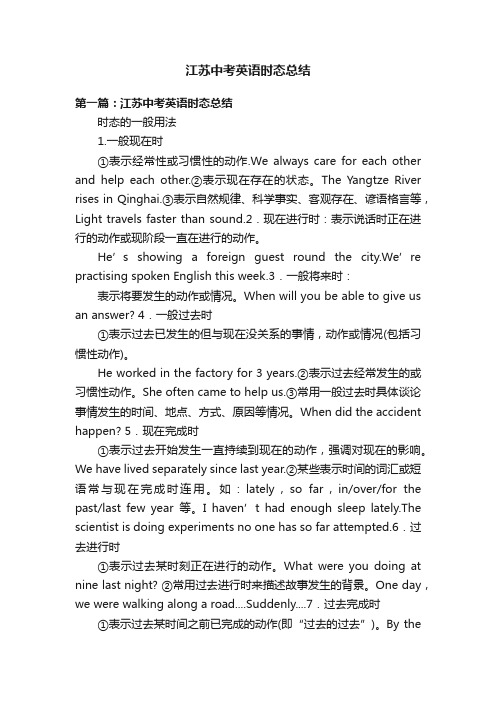
江苏中考英语时态总结第一篇:江苏中考英语时态总结时态的一般用法1.一般现在时①表示经常性或习惯性的动作.We always care for each other and help each other.②表示现在存在的状态。
The Yangtze River rises in Qinghai.③表示自然规律、科学事实、客观存在、谚语格言等,Light travels faster than sound.2.现在进行时:表示说话时正在进行的动作或现阶段一直在进行的动作。
He’s showing a foreign guest round the city.We’re practising spoken English this week.3.一般将来时:表示将要发生的动作或情况。
When will you be able to give us an answer? 4.一般过去时①表示过去已发生的但与现在没关系的事情,动作或情况(包括习惯性动作)。
He worked in the factory for 3 years.②表示过去经常发生的或习惯性动作。
She often came to help us.③常用一般过去时具体谈论事情发生的时间、地点、方式、原因等情况。
When did the accident happen? 5.现在完成时①表示过去开始发生一直持续到现在的动作,强调对现在的影响。
We have lived separately since last year.②某些表示时间的词汇或短语常与现在完成时连用。
如:lately,so far,in/over/for the past/last few year等。
I haven’t had enough sleep lately.The scientist is doing experiments no one has so far attempted.6.过去进行时①表示过去某时刻正在进行的动作。
2024年江苏中考英语语法专题清单十动词时态详解真题训练(练习版)

备战2024年中考语法专题清单十、动词时态详解+习题解析清单导图概述:动词主要表示动作,其次表示状态。
动作和状态的发生有一定的时间和表现方式,这就是英语中动词的时态。
英语中动词的时态主要由动词的不同形式来表示。
英语中动词的时态有十六种,初中阶段要求掌握的有六种,要求了解的有两种。
一般现在时主要用来表示经常性、习惯性的动作或现在的状态。
它的主要构成形式是:1、一般现在时的构成经常与often,usually,always,sometimes,every day等时间状语连用。
She usually gets up at 6:30.她通常六点半起床。
I play football after school every afternoon.我每天下午放学后踢足球。
(2)表示现在的情况或状态I enjoy playing puter games. 我喜欢玩电脑游戏。
She speaks Spanish. 她说西班牙语。
(3)表示客观真理The sun rises in the east and sets in the west.太阳东升西落。
The earth travels around the sun. 地球绕太阳旋转。
(4)表示将来①表示按时刻表或安排到时间就会发生的事情或动作The train arrives at 10: 30. There's plenty of time.火车十点半到达。
还有很多时间。
②在时间状语从句和条件状语从句中If you arrive,please give me a phone call.如果你到了,请给我打个。
As long as it doesn't rain tomorrow, we'll have a trip.只要明天不下雨,我们就去旅行。
I will discuss this matter with you when we meet next time.下次见面时我会和你讨论这件事。
202X年江苏南京中考语法复习之时态
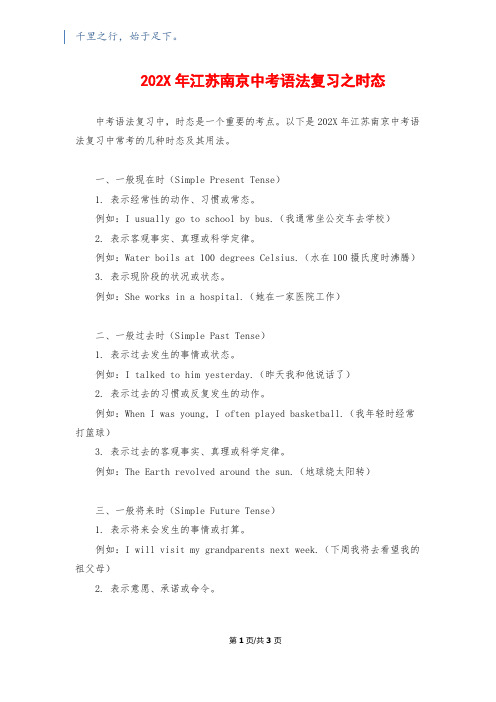
千里之行,始于足下。
202X年江苏南京中考语法复习之时态中考语法复习中,时态是一个重要的考点。
以下是202X年江苏南京中考语法复习中常考的几种时态及其用法。
一、一般现在时(Simple Present Tense)1. 表示经常性的动作、习惯或常态。
例如:I usually go to school by bus.(我通常坐公交车去学校)2. 表示客观事实、真理或科学定律。
例如:Water boils at 100 degrees Celsius.(水在100摄氏度时沸腾)3. 表示现阶段的状况或状态。
例如:She works in a hospital.(她在一家医院工作)二、一般过去时(Simple Past Tense)1. 表示过去发生的事情或状态。
例如:I talked to him yesterday.(昨天我和他说话了)2. 表示过去的习惯或反复发生的动作。
例如:When I was young, I often played basketball.(我年轻时经常打篮球)3. 表示过去的客观事实、真理或科学定律。
例如:The Earth revolved around the sun.(地球绕太阳转)三、一般将来时(Simple Future Tense)1. 表示将来会发生的事情或打算。
例如:I will visit my grandparents next week.(下周我将去看望我的祖父母)2. 表示意愿、承诺或命令。
第1页/共3页锲而不舍,金石可镂。
例如:I promise that I will help you with your homework.(我保证我会帮你做作业)四、现在进行时(Present Continuous Tense)1. 表示现在正在进行的动作。
例如:He is playing football now.(他正在踢足球)2. 表示现阶段的临时性情况或趋势。
中考一般现在时、一般过去时、一般将来时讲义
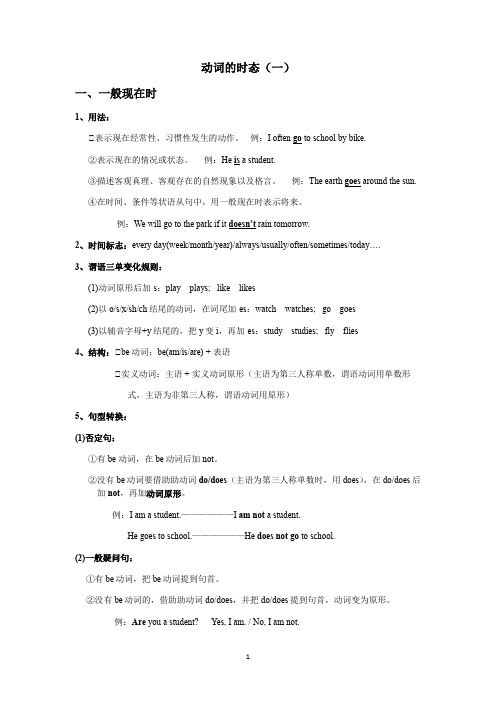
动词的时态(一)一、一般现在时1、用法:①表示现在经常性、习惯性发生的动作。
例:I often go to school by bike.②表示现在的情况或状态。
例:He is a student.③描述客观真理、客观存在的自然现象以及格言。
例:The earth goes around the sun.④在时间、条件等状语从句中,用一般现在时表示将来。
例:We will go to the park if it doesn’t rain tomorrow.2、时间标志:every day(week/month/year)/always/usually/often/sometimes/today….3、谓语三单变化规则:(1)动词原形后加-s:play---plays; like---likes(2)以o/s/x/sh/ch结尾的动词,在词尾加-es:watch---watches; go---goes(3)以辅音字母+y结尾的,把y变i,再加-es:study---studies; fly---flies4、结构:①be动词:be(am/is/are) + 表语①实义动词:主语 + 实义动词原形(主语为第三人称单数,谓语动词用单数形式,主语为非第三人称,谓语动词用原形)5、句型转换:(1)否定句:①有be 动词,在be动词后加not。
②没有be动词要借助助动词do/does(主语为第三人称单数时,用does),在do/does后加not,再加动词原形。
例:I am a student.——————I am not a student.He goes to school.——————He does not go to school.(2)一般疑问句:①有be动词,把be动词提到句首。
②没有be动词的,借助助动词do/does,并把do/does提到句首,动词变为原形。
例:Are you a student? Yes, I am. / No, I am not.Does he go to school? Yes, he does. / No, he doesn’t.二、一般过去时1、定义:用于表示过去时间内发生的动作。
初中英语时态讲解及练习(含答案)

初中英语时态讲解及练习(含答案)时态1. 一般现在时●形式:do does(单数第三人称)●意义:一般现在时表示客观的、普遍性的真理以及经常性的事件。
●用法:A) 表示现在发生的动作、情况、状态和特征。
B) 经常性、习惯性动作。
e.g.:He always helps others. (他总是帮助别人。
)He often goes to the gym.C) 客观事实和普遍真理。
尤其要注意,如果前后文不是一般现在时,则无法保持主句、从句时态一致。
e.g.: The sun rises in the east and sets in the west.Knowledge is power.●这一用法场合一些表动作频率的时间副词连用:1). 表示肯定的频率副词:always, frequently, usually, sometimes, generally, occasionally, often etc.2). 表示否定的频率副词:never, seldom, rarely etc.这些副词的位置:在Be动词后,实义动词前。
e.g. He is always late.2. 一般过去时●形式:did●意义:一般过去时表示在过去的某一特定时间发生和结束的活动或情况。
●用法:A) 表示过去某个时间发生的动作或情况。
e.g.: I saw him in the library yesterday morning. (有特定的时间状语)yesterday, yesterday evening, last night/month/spring/year, the night before last(前天晚上),three days/months/years ago, in 1999 etc.。
这些时间状语之前不用加介词。
B) 表示过去习惯性动作,一直持续或反复发生的动作,此时可与表示拼读的时间副词连用。
e.g.: I slept for eight hours last night. (表示在过去某一段时间内持续的动作,但这动作现在已经结束了)3. 一般将来时●形式:will/shall do或be going to do●意义:一般将来时表示在未来的某个时间将要发生的某个动作或状态。
2024年中考英语时态复习之一般现在时讲义
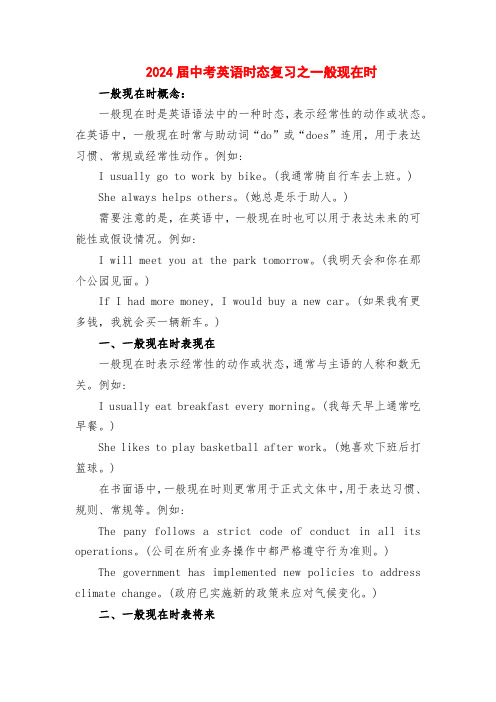
2024届中考英语时态复习之一般现在时一般现在时概念:一般现在时是英语语法中的一种时态,表示经常性的动作或状态。
在英语中,一般现在时常与助动词“do”或“does”连用,用于表达习惯、常规或经常性动作。
例如:I usually go to work by bike。
(我通常骑自行车去上班。
)She always helps others。
(她总是乐于助人。
)需要注意的是,在英语中,一般现在时也可以用于表达未来的可能性或假设情况。
例如:I will meet you at the park tomorrow。
(我明天会和你在那个公园见面。
)If I had more money, I would buy a new car。
(如果我有更多钱,我就会买一辆新车。
)一、一般现在时表现在一般现在时表示经常性的动作或状态,通常与主语的人称和数无关。
例如:I usually eat breakfast every morning。
(我每天早上通常吃早餐。
)She likes to play basketball after work。
(她喜欢下班后打篮球。
)在书面语中,一般现在时则更常用于正式文体中,用于表达习惯、规则、常规等。
例如:The pany follows a strict code of conduct in all its operations。
(公司在所有业务操作中都严格遵守行为准则。
) The government has implemented new policies to address climate change。
(政府已实施新的政策来应对气候变化。
)二、一般现在时表将来一般现在时表将来是英语语法中的一种时态,表示将来的动作或状态。
在英语中,一般现在时通常与将来时态连用,形成“一般现在时+将来时”的句型,用于表达将来的意图、计划或安排。
例如:I'm going to meet my friend tomorrow afternoon。
2022年江苏省中考复习专题动词的六大时态
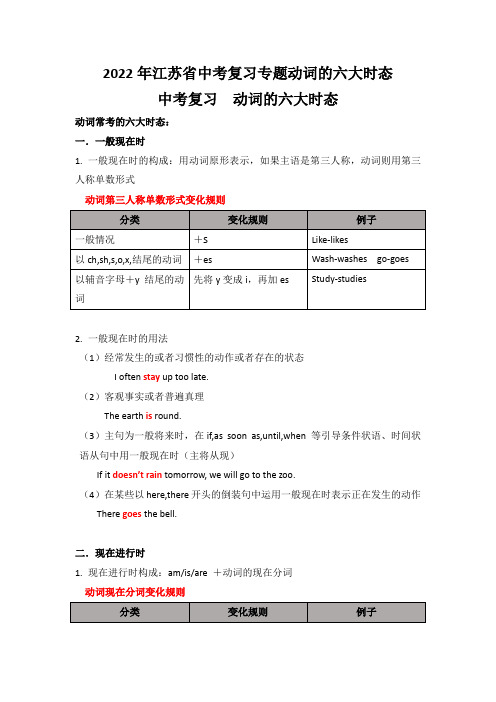
2022年江苏省中考复习专题动词的六大时态中考复习动词的六大时态动词常考的六大时态:一.一般现在时1.一般现在时的构成:用动词原形表示,如果主语是第三人称,动词则用第三人称单数形式动词第三人称单数形式变化规则2.一般现在时的用法(1)经常发生的或者习惯性的动作或者存在的状态I often stay up too late.(2)客观事实或者普遍真理The earth is round.(3)主句为一般将来时,在if,as soon as,until,when 等引导条件状语、时间状语从句中用一般现在时(主将从现)If it doesn’t rain tomorrow, we will go to the zoo.(4)在某些以here,there开头的倒装句中运用一般现在时表示正在发生的动作There goes the bell.二.现在进行时1.现在进行时构成:am/is/are +动词的现在分词动词现在分词变化规则2.现在进行时的用法(1)表示此时此刻正在进行的动作I am reading now.(2)现阶段正在进行的动作或者持续的状态The students are studying English these days.(3)表示将来:go,come,leave,start,begin表示即将发生或安排好要做的事The train is coming soon.三.一般将来时1.一般将来时的构成(1)will +动词原形I will go to shanghai next week.(2)Be going to +动词原形What are you going to do next Sunday?四.一般过去时1.一般过去式的构成动词过去式2.一般过去式的用法(1)过去某个时间发生的动作或者存在的状态We visited the library last week.(2)过去的习惯或者经常发生的动作(也可以用used to do 表示过去常常做某事)When I was in the countryside, I used to swim in the river.五.过去进行时1.过去进行时的构成Was/were +动词现在分词2.过去进行时的用法(1)过去某一时刻或者一段时间正在进行的动作I was doing my homework when my sister came in .(2)go,come,leave,arrive,start等动词的过去进行时表示过去按计划即将发生的动作She was leaving when I arrived.六.现在完成时1.现在完成时的构成have/has+done2.现在完成时的用法(1)发生在过去或已经完成的某个动作对现在造成的影响或产生的结果I have lost my schoolbag.(2)动作或者状态在过已经开始,并持续到现在,也许还要持续下去Miss Lu has taught English for 20 yeas.常和for+时间段或者since+时间点/从句连用肯定句中的动词为延续性动词延续性动词和非延续性动词转换练习一.填入正确的单词形式1.Bicycle sharing is chosen instead of ________ (drive) to work by more and more people now.2.— Do you think that robots will take the place of humans in the future?— I don’t think so. After all, the smartest robots are __________ (control) and made by people.3.Jack has just moved here and this is the third time when he has__________ (迷失)his way.4. Her parents hope she can follow his heart when he __________ (选择)her job.5.It is said the this museum __________ (name)after Qu Qiubai many years ago.6.keep your eyes open,or you__________ (miss)the most important moment of the meeting.7.The workers in the factory __________ (product)hundreds of new energy cars every month.8.Helen______ (prefer)English to Chinese last term.9.—Are you going to have a party _____________(celebrate) your birthday?—Sorry,I______ (not decide).10.Mum makes me eat an apple every day _________ (keep) healthy.11.The train you are looking forward to _________ (leave)a moment ago.12.Mum ________ (hang) her coat behind the door and went to the kitchen toprepare dinner.13.I have already ________ (节省)enough money to buy my father a tie.14.The tiger ________ (breathe) heavily! Send for a doctor as soon as possible!15.I couldn’t remember the fairy story I wanted to tell her, so I ________ (make) one up.16.We ______ (test) the new machine when the electricity ______ (go) off.17. She ______ (not want) to stay in bed while the others ______ (all, work) in the fields.18. I wasn't sure whether he _______(lend) me his book the next morning.19. Whenever she had time, she ______(help) them in their work.20.Nanjing is an ancient city of culture and well worth ________(visit).二.单项选择1.—Helen has gone out.—Oh, has she? What time _______ she ________?A.has; gone B.did; go C.is; going D.will; go2.I saw the twins in the playground yesterday afternoon. They ________ games with their classmates then.A.play B.will play C.are playing D.were playing3.Up to now,Beijing_____the first city in the world to host both a summer and a winter Olympic event.A.has becomeB.becomesC.has beenD.was4.____not only Simba 's car but also his friends' cars____ last night?A.Did;break downB.Was;broke downC.Is;broke downD.Were;break down5.It ____more than 20 years since Hong Kong ______to China.A.is;returnedB.was;returnedC.has been;has returnedD.have been;has returned6.The two sessions(两会)______for about 4 days so far and many topics such as“double reduction(双减)"were discussed during that period.A.have startedB.have endedC.have been onD.have been over7.I thought I heard him come in while we ________ dinner.A.was having B.were having C.having D.Had8.We had great fun ________ a tent while going on a picnic last month.A.putting up B.to put up C.to put in D.putting in 9.—The plane is leaving right now, but Jim hasn’t arrived yet.—Well, he said he _____here on time.A. cameB. would comeC. can beD. will be10.Helen is pleased that she _________ her lost watch.A.finds B.found C.has found D.will find11. Alisa _____in the chicken when you called her at 5 o’clock this afternoon.A. is cookingB. was cookingC. cooksD. cooked12. —You were not in when I went there yesterday.—Oh, I _______ for a friend from England at the airport at that moment.A. had waitedB. was waitingC. am waitingD. have waited13.I don't know if Hanna______to the party tomorrow. I'll call you if she _______.es; will comeB. will come; will comees;comesD. will come; comes14.—Miss Lu,I haven't seen you for a long time.-Yes. I_____ as a volunteer nurse in Shanghai for a month.I came back yesterday.A.workedB.am workingC.have workedD.work15.—Amanda,what were you doing at this time yesterday afternoon?-I____ the film The Battle at Lake Changjin with my sister.A.watchB.watchedC.was watchingD.am watching16.Xiao ming____a simple life and saves her money for donations.A.livesB.livedC.was livingD.will live17.—May I speak to Wang ming?—Sorry, she is not at home.She_____ since last month.A.leftB.has leftC.has been awayD.went away18.—Where were you yesterday afternoon?—I ________ the project with my friends the whole afternoon.A.discussed B.am discussing C.was discussing D.will discuss 19.—We couldn’t find you anywhere around 8 o’clock yesterday evening.—I’m sorry for that. I in the supermarket then.A.shopped B.am shopping C.was shopping D.will shop 20.— Max, did you feel a slight shake at 9: 46 last night? I heard an earthquake hit your city.— Sure! I ________ my homework in the study.A.did B.am having C.would do D.was doing。
中考初中英语主要时态系列讲座(一)---一般现在时精讲及练习(含答案)
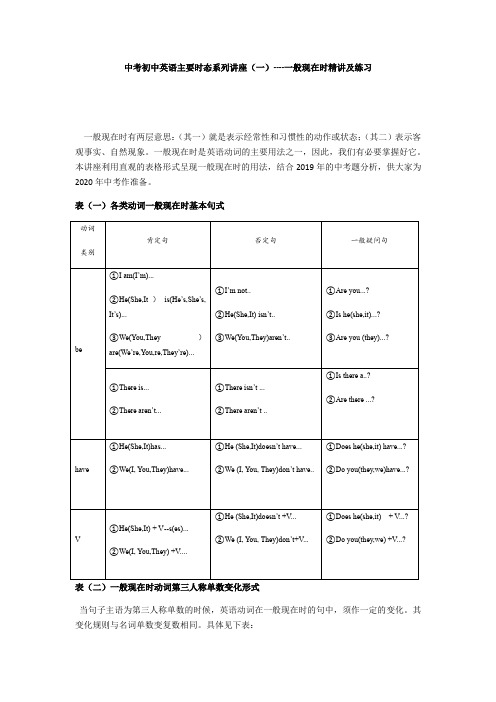
中考初中英语主要时态系列讲座(一)----一般现在时精讲及练习一般现在时有两层意思:(其一)就是表示经常性和习惯性的动作或状态;(其二)表示客观事实、自然现象。
一般现在时是英语动词的主要用法之一,因此,我们有必要掌握好它。
本讲座利用直观的表格形式呈现一般现在时的用法,结合2019年的中考题分析,供大家为2020年中考作准备。
表(一)各类动词一般现在时基本句式表(二)一般现在时动词第三人称单数变化形式当句子主语为第三人称单数的时候,英语动词在一般现在时的句中,须作一定的变化。
其变化规则与名词单数变复数相同。
具体见下表:表(三)一般现在时常用时间状语由于一般现在时主要表示经常性或习惯性的动作,所以,在句中就有一些表示性惯性或经常性的副词或短语去说明动作的经常性或习惯性。
现将于一般现在时相关的这些副词或短语,归纳在表中,供大家掌握。
表(四)一般现在时的主要用法【典型考例1】(2019北京)Sam ______with his friends every weekend.A. skatesB. is skatingC. has skatedD. was skating【析】正确答案:A 。
句意是:每个周末,山姆都和朋友们一起滑冰。
根据句末的频度副词短语every weekend(每周末)可知,句子表示的动作具有经常性,所以动词应使用一般现在时。
【典型考例2】(2019青海)----What did you learn in geography yesterday?----I learned that the sun _____ in the east.A.was risingB.risesC.rose【析】正确答案:B。
句意是:昨天的地理课上你学了什么?我学了太阳从东边升起来。
太阳从东边升起来,表示的客观事实,一种自然现象,所以,句中的动词应使用一般现在时,因此,正确答案为B。
【典型考例3】(2019山东临沂)---I'm getting hungry. Do you know where we can get some good food?--- Of course! There ____________ a restaurant around the comer.A. will beB. wasC. is【析】正确答案:C。
中考英语八大时态精解+精练+答案

中考英语八大时态精解+精练+答案一、一般现在时1、概念:表示经常发生的情况;有规律出现的情况;总是发生的;事实真理。
2.时间状语:Always, usually, often, sometimes, every week (day, year, month…), once a week (day, year, month…), on Sundays (on Mondays…), etc.3.基本结构:主语+动词原形(如主语为第三人称单数,动词上要改为第三人称单数形式)4.否定形式:主语+am / is / are+not+其他;此时态的谓语动词若为行为动词,则在其前加don't,如主语为第三人称单数,则用doesn't,同时还原行为动词。
5.一般疑问句:把be 动词放于句首;用助动词do 提问,如主语为第三人称单数,则用does,同时,还原行为动词。
eg:①It seldom snows here. 这里很少下雪。
②He is always ready to help others. 他总是乐于帮助别人。
③Action speaks louder than words. 事实胜雄辩。
二、一般过去时1.概念:过去某个时间里发生的动作或状态;过去习惯性、经常性的动作、行为。
2.时间状语:ago,yesterday,the day before yesterday,last week,last (year,night,month…), in 1989, just now, at the age of 5, one day, long long ago, once upon a time,etc.3.基本结构:主语+动词的过去式或be 的过去式+名词4.否定形式:主语+was / were+not+其他;在行为动词前加didn't,同时还原行为动词。
5.一般疑问句:was 或were 放于句首;用助动词do 的过去式did 提问,同时还原行为动词。
- 1、下载文档前请自行甄别文档内容的完整性,平台不提供额外的编辑、内容补充、找答案等附加服务。
- 2、"仅部分预览"的文档,不可在线预览部分如存在完整性等问题,可反馈申请退款(可完整预览的文档不适用该条件!)。
- 3、如文档侵犯您的权益,请联系客服反馈,我们会尽快为您处理(人工客服工作时间:9:00-18:30)。
一、一般现在时有三种形式1. 谓语是be(am/is/are)的一般现在时。
①肯定形式:主语+be+表语(形容词、名词充当表语)。
I am hungry.You are beautiful.He is a doctor.②否定形式:主语+be+not+表语(形容词、名词充当表语)。
I am not hungry.You aren't beautiful.He isn't a doctor.③一般疑问句形式:Be+主语+表语(形容词、名词充当表语)? 肯定回答:Yes,主语+be. 否定回答:No, 主语+ be+not.—Are you hungry?—Yes,I am./No,I'm not.—Is he a doctor?—Yes, he is./No, he isn,t.④特殊疑问句形式:特殊疑问词+Be开头的一般疑问句?—What is he?—He is a doctor.注意:be要随着主语变。
2. 谓语动词是实义动词(及物动词或不及物动词)的一般现在时。
①肯定形式:“主语+及物动词+宾语”或“主语+不及物动词”。
She has a little brother.她有一个弟弟。
The sun rises in the east.太阳从东方升起。
②否定形式:“主语+don't/doesn't+及物动词+宾语”或“主语+don't/doesn't+不及物动词”。
She doesn't have a little brother.她没有弟弟。
I don't eat every morning.我每天早晨都不吃饭。
③一般疑问句形式:“Do/Does+主语+及物动词原形+宾语”或“Do/Does+主语+不及物动词原形”。
肯定回答:Yes,主语+do/does. 否定回答是:No, 主语+ don't/doesn't.—Do you eat every morning?—Yes, I do./No, I don't.—Does she have a little brother?—Yes, she does./No, she doesn't.④特殊疑问句:特殊疑问词+do/does开头的一般疑问句?What do you like?When do you go to school?注意:根据主语确定用do还是does。
3. 谓语是情态动词can/may...+动词原形的一般现在时。
①肯定形式:主语+情态动词can/may.....+动词原形+宾语。
I can finish my homework.②否定形式:主语+情态动词can/may.....+not+动词原形+宾语。
I can't finish my homework.③一般疑问句形式:情态动词Can/May.....+主语+动词原形+主语+宾语。
肯定回答是:Yes,主语+情态动词. 否定回答是:No, 主语+ 情态动词+not.—Can you finish your homework?—Yes,I can./No, I can't.④特殊疑问句形式:特殊疑问词+情态动词can/may.....开头的一般疑问句?—What can you do?—I can do my homework.注意:情态动词can/may.....+动词原形。
二、一般现在时的用法1. 一般现在时表示现在的状态;表示经常性或习惯性的动作;表示主语具备的性格和能力;表示客观事实或普遍真理等。
例如:He is twelve. 他十二岁了。
I go to school at seven every day. 我每天七点去上学。
They can speak Japanese. 他们会说日语。
2. 一般现在时常和表示时间的频度副词连用。
如:often, usually, sometimes, always, never等。
例如:I often read books in the evening.我经常在晚上读书。
Do they usually go to school by bike? 他们通常骑自行车去上学吗?He doesn’t like milk. He never drinks it.他不喜欢牛奶。
他从来不喝它。
Sometimes my mother gets back at five. 有时候妈妈五点钟回来。
3. 一般现在时也常和以下时间表达法连用。
如:in the morning, in the afternoon, in the evening, at noon, at night, every day, on Sunday(s), at seven 等。
例如:Do they have math in the morning?他们早上有数学课吗?She sleeps nine hours every night.她每晚睡九个小时。
It takes me two hours to do my homework every day.每天写作业花费我两个小时的时间。
They don’t have classes on Sundays.他们周日不上课。
4. 一般现在时表示将来含义a. 下列瞬时动词come, go, arrive, leave, start, begin, return的一般现在时可以表示将来,主要用来表示在时间上已确定或安排好的事情。
例如:The train leaves at six tomorrow morning. 火车明天上午六点开。
----When does the bus star? 汽车什么时候开?----It stars in ten minutes. 十分钟后。
b. 在主从复合句中,当主句是一般将来时,时间或条件状语从句的谓语动词只能用一般现在时来表示将来要发生的动作,即所谓的“主将从现”。
例如:When Bill comes (不是will come), ask him to wait for me. 比尔来后,让他等我。
I'll write to you as soon as I arrive there. 我到了那里,就写信给你。
三、动词第三人称单数的构成1. 动词原形后面直接加-slook—looks read—reads play—plays stop—stops2. 在以字母s, x,ch,sh,o结尾的动词后加-es miss—missesfix—fixes watch—watches wash—washesgo—goes do—does3. 辅音字母加y结尾的动词变y为i,再加-es carry–carries study–studies hurry–hurries cry–cries4. 特殊变化have-hasbe-is4、练习及答案【典型考例1】(2019北京)Sam ______with his friends every weekend.A. skates B. is skating C. hasskated D. was skating【析】正确答案:A 。
句意是:每个周末,山姆都和朋友们一起滑冰。
根据句末的频度副词短语every weekend(每周末)可知,句子表示的动作具有经常性,所以动词应使用一般现在时。
【典型考例2】(2019青海)----What did you learn in geography yesterday?----I learned that the sun _____ in the east.A. wasrising B.rises C.rose【析】正确答案:B。
句意是:昨天的地理课上你学了什么?我学了太阳从东边升起来。
太阳从东边升起来,表示的客观事实,一种自然现象,所以,句中的动词应使用一般现在时,因此,正确答案为B。
【典型考例3】(2019山东临沂)---I'm getting hungry. Do you know where we can get some good food?--- Of course! There ____________ a restaurant around the comer. A. will be B.was C. is【析】正确答案:C。
句意是:我很饿。
你知道哪儿可以弄到吃的吗?当然!拐角附近有一家饭馆。
“拐角附近有一家饭馆”表示的是客观事实,所以句中动词应使用一般现在时。
动词be的一般现在时为is。
因此,正确答案为C。
【典型考例4】(2019广西贵港)---If the traffic _______busy, Linda won' t catch the train in one hour.---I know I will call her to leave for the train station at once.A.isB.will beC.wasD.has been【析】正确答案A。
句意是:如果交通拥堵的话,琳达一个小时后就不会赶上这趟列车。
我知道,我会打电话给她,让她立刻就去火车站。
因为这是if引导的条件状语从句,主语为一般将来时won’t catch the train in one hour,所以,从句用一般现在时表示将来,所以动词be应改为第三人称单数形式is,因此,正确答案为A。
【强化练习】一、根据汉语或首字母,写出正确的单词,使句子意思完整。
1.(2019四川广安)That music_________ (听起来)very beautiful.I like ita lot.2.(2019四川凉山州)The Russian soup s_____ very nice. I can’t wait to drink it.3.(2019江苏盐城)There are many rocks in unusual shapes ----Some hang down , and others ______ (指向)upwards.4.(2019湖北荆门)This kind of special noodles t so delicious that I can’t help asking for more.5.(2019广西北部湾经济开发区)Every time I want to give up, my parents always____(鼓励)me to keep trying.6.(2019黑龙江绥化)I ______ (发送)an e--mail to my pen pal in England once a week.7.(2019贵州铜仁)It t__________ us 90 minutes from Tongren to Guiyang by high speed train.8.(2019贵州铜仁)The early bird c__________ the worm.9.(2019广西百色)I p______ milk to cola because milk is much healthier,I think.10.(2019新疆建设兵团)Li Rui _____(弹奏)the guitar after school every day.二、用所给单词的正确形式填空,使句子意思完整。
